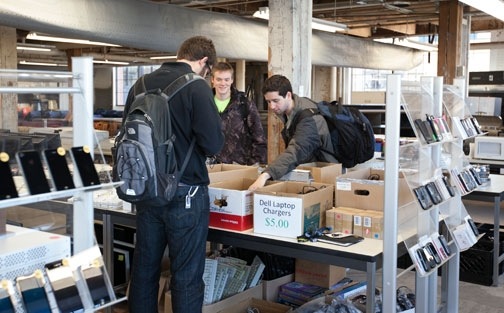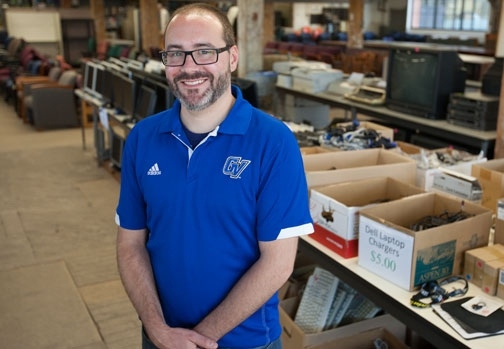Another man's treasure
Finding new life for university surplus
by Nate Hoekstra
video by Jeremy Knickerbocker
An industrial meat grinder sits on a shelf, worn but clean, next to a Starbucks-sized cappuccino machine that bears a “make an offer” sign. They’re sitting in the same section of Grand Valley’s new Surplus Store as saute pans, soup crocks, chef’s knives and bundles of silverware that may, at some point on its journey, have spent an extended stay in a dark corner of a dorm room after being “borrowed” from Campus Dining by a student.
A few shelves over sits a used electric typewriter, dozens of computer monitors, a handful of iPhones, and a collection of hats, scarves and gloves. The common bond of the items for sale is that they once served someone — student, faculty or staff member — at Grand Valley.
But all things have a life cycle, an expected useful period during which the university realized its investment. At the end of that life, the value is nearly gone, but the physical material remains.
That’s where Aaron Caccamo and his staff at the surplus store take over. Caccamo, the senior strategic sourcing specialist in the Procurement Services department, oversees the surplus store as part of a larger team effort that he said serves to “responsively repurpose” the materials that a community the size of a small city no longer needs.
“What we do here is keep items out of the landfill and generate some revenue from the university’s old stuff,” Caccamo said. “We’re responsible for disposal of university inventory, whether that’s by selling it, recycling it or scrapping it.”
Caccamo’s unit gets a lot of stuff and a wide variety of items. Most businesses need to deal with old furniture, office supplies and technology, but universities have the equipment of a small city. The surplus store takes in couches, cookie sheets, golf clubs, lawn mowers, fume hoods from chemistry labs, microscopes and much more.
“If you’ve seen it on campus before, it will come through our doors someday,” Caccamo said.
When a piece of equipment has outlived its useful life for the department or college that bought it in the first place, they call Caccamo or Tony Marinelli, a former student worker and the store’s current assistant manager, who organize a time to pick up the materials. It goes on a truck and is taken to the store on Front Street in Grand Rapids next to the L. William Seidman Center. Then a step-by-step process begins.

Shoppers browse the tech equipment at Grand Valley’s new
Surplus Store.
photos by Elizabeth Lienau
Surplus Store
140 Front St., Grand Rapids, MI
Open on Wednesdays from 9 a.m.-3 p.m.
The first decision to make is if the item is destined for recycling and scrapping, or if it will end up for sale on the floor during the store’s weekly Wednesday-only sales.
“It used to be a tough decision for some things,” Caccamo said. “But I learned very quickly that even if I thought, ‘There’s no way anyone would ever buy this,’ that most of the time it wasn’t the case.”
Items that will be scrapped are disassembled and broken down into individual parts to maximize value. Computers that can’t be salvaged are broken down so far that even processors are removed from motherboards.
“The gold on the processor is worth more than other generic metal scrap, obviously, so we take the time to maximize our return,” Caccamo said.
If an item is deemed saleable, student workers will clean it up and reset any electronics, then figure out how much it will cost.
“We learned very quickly how to price items,” said store employee Erica Ketchum, a sophomore biomedical science and Spanish major. “We find as much information as we can on the Internet, through eBay and Craigslist, and price things to move. If items stick around on the shelves for too long, we know we priced it too high, and we’ll drop the price to get through the inventory we have on hand.”
The store has sold more than $80,000 worth of surplus material since it opened. The goal is to eventually use some of that money to fund scholarships for students.

Aaron Caccamo, senior strategic sourcing specialist in the Procurement Services department, oversees the Surplus Store.
Caccamo said he gives students freedom to price items based on what they find as they do research on each product.
“We’ve got a pretty good idea of what this stuff is worth once we put the time and work into each item,” he said, “so we’re not going to go for a lowball, but we want to get stuff off the shelves. We’re more flexible on the one-of-a-kind items.”
Not everything that comes into the surplus store can be sold. Sometimes the equipment has outlived any useful life, and must be recycled or scrapped, which meets the store’s goal of being sustainable.
Caccamo said that since the store opened in February 2014, they have worked to recycle nearly 120,000 pounds of metal at a local scrap dealer, along with more than 5.5 tons of eWaste, which includes PCs, monitors, printers and other electronics that weren’t able to be salvaged.
“We work really hard to manage our environmental impact,” Caccamo said. “There’s not a lot of waste. We sell as much as we can, scrap what we can from what’s left, recycle the leftovers and send as little as possible to the landfill. We’re proud of our commitment to sustainability here.”
The wide variety of materials means lots of applications for new buyers.
Bill Lucksted, manager of operations for Pew Campus and Regional Centers, purchased items from the store to outfit a hunting cabin that he owns in northern Michigan. He bought a few sections of bench-style restaurant seating from a recent remodel of Kleiner Commons, along with a high-top table and bar-height stools.
“It’s a great table for playing cards on,” Lucksted said. He has furnished a good portion of his cabin with surplus store furniture and equipment, and even uses an old office chair out in the woods in his blind. “It’s really nice being able to have something that adjusts up and down and can turn side to side without squeaking. It’s much more comfortable than what I was used to sitting on,” he said.
Other pieces from the store have been uniquely repurposed. A set of lockers that was sold is being used as individual storage spaces in a bathroom of a fraternity house in Allendale. Other buyers tell Caccamo that they’re planning art pieces, or are buying a piece simply to take one part off of it. The possibilities are endless, he said.
The store has sold more than $80,000 worth of surplus material since it opened. The goal is to eventually use some of that money to fund scholarships for students.
“The students who work here learn a ton about business,” Caccamo said. “This is an incubator. The students who work here take an active role in running this day-to-day. They’re learning about price points, market values, supply management, accounting and more.”
One student, a marketing major, created a marketing plan for the store when it first opened. Another student pitched an idea for a social media plan that Caccamo said has helped drive business.
Ketchum, the sophomore student who does everything from run the cash register to work on preparing incoming pieces for sale, said that in addition to learning general business skills, she genuinely enjoys her job.
“It’s a unique student job that I never thought I’d be doing,” Ketchum said. “It’s super interesting, and the atmosphere is really fun, and it’s a very different work experience that I’m glad to have.”
